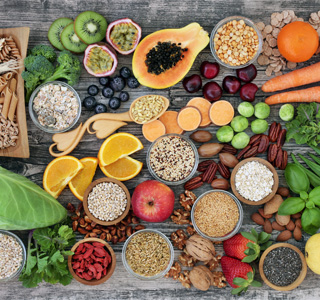What Are “Healthy” Carbs?
Carbohydrates, or carbs, can get a bad rap, especially with eating plans like the paleo and keto diets claiming leaving carbs behind is the key to losing weight, gaining energy, and growing muscle. Despite this trend, elite athletes and normal, active women and men are trying out plant-based diets, which are naturally higher in healthy carbs.
Simply put, your body needs carbs to function properly. Beyond the obvious carb sources like bread, rice, potatoes, and pasta, carbs are also found in green vegetables, fruit, legumes, and milk. If you limit carbs, you are also limiting the nutrients these foods are chock-full of.
One of carbs main jobs is to provide us with glucose, a type of sugar that is our primary source of fuel, which is why when your carbs are depleted your energy levels and exercise performance may suffer. The glucose moves into the liver and muscles to create glycogen stores. Your system then draws on these stores whenever it needs stamina and strength. Your body also uses the glucose from carbs to burn fat for energy.
Along with powering the body, glucose also powers the brain. According to research from Tufts University, women who ate a no-carb diet for one week performed worse on memory tests than those who just followed a low-calorie diet.
On top of it all, glucose is pertinent to keeping us happy and satiated. It helps the brain absorb the amino acid tryptophan, which starts the production of serotonin. Serotonin is a neurotransmitter that suppresses the appetite and boosts the mood.
How many grams of carbs should you eat per day?
There is not an across-the-board answer to this question. The number of carbs you should consume in a day depends on your size and activity level. For women who exercise moderately most days, two grams of carbs per pound of bodyweight will support your work out. For example, about one tablespoon of cooked rice has about two grams of carbs. Men who exercise regularly should consume between 2.3 to 4.5 grams of carbs per pound of bodyweight. However, if you regularly put in more than an hour of intense, consistent effort, you may need more.
Which kind of carb is the healthy kind?
While it is obvious that carbs are essential, not all carbs are created equal. There are two major types of carbs: simple and complex. Complex carbs are digested more slowly and supply your body with a more steady release of glucose into the bloodstream. Simple carbs have been processed and many of their nutrients and fiber has been removed. Plus, simple carbs release glucose into your bloodstream quickly, causing a sugar crash later. Common complex carbs are whole grains, legumes, fruits, and vegetables. Steer clear of white rice, white bread, and baked goods. Additionally, complex carbs, because they are higher in fiber, keep you full longer, your energy higher, lower your risk of heart disease, and promote better GI health. Aim for about 25 grams of fiber per day. About 20 percent of a food’s carbs should come from fiber.
Spread it out, but not on a bagel
Spread your carb intake out throughout the day to keep your energy levels stable. Eat a small number of carbs at each meal and each snack and pair them with protein to keep you feeling full and satisfied, your metabolism high, and your body building muscle. Try pairing one gram of protein for every two grams of carbs.
